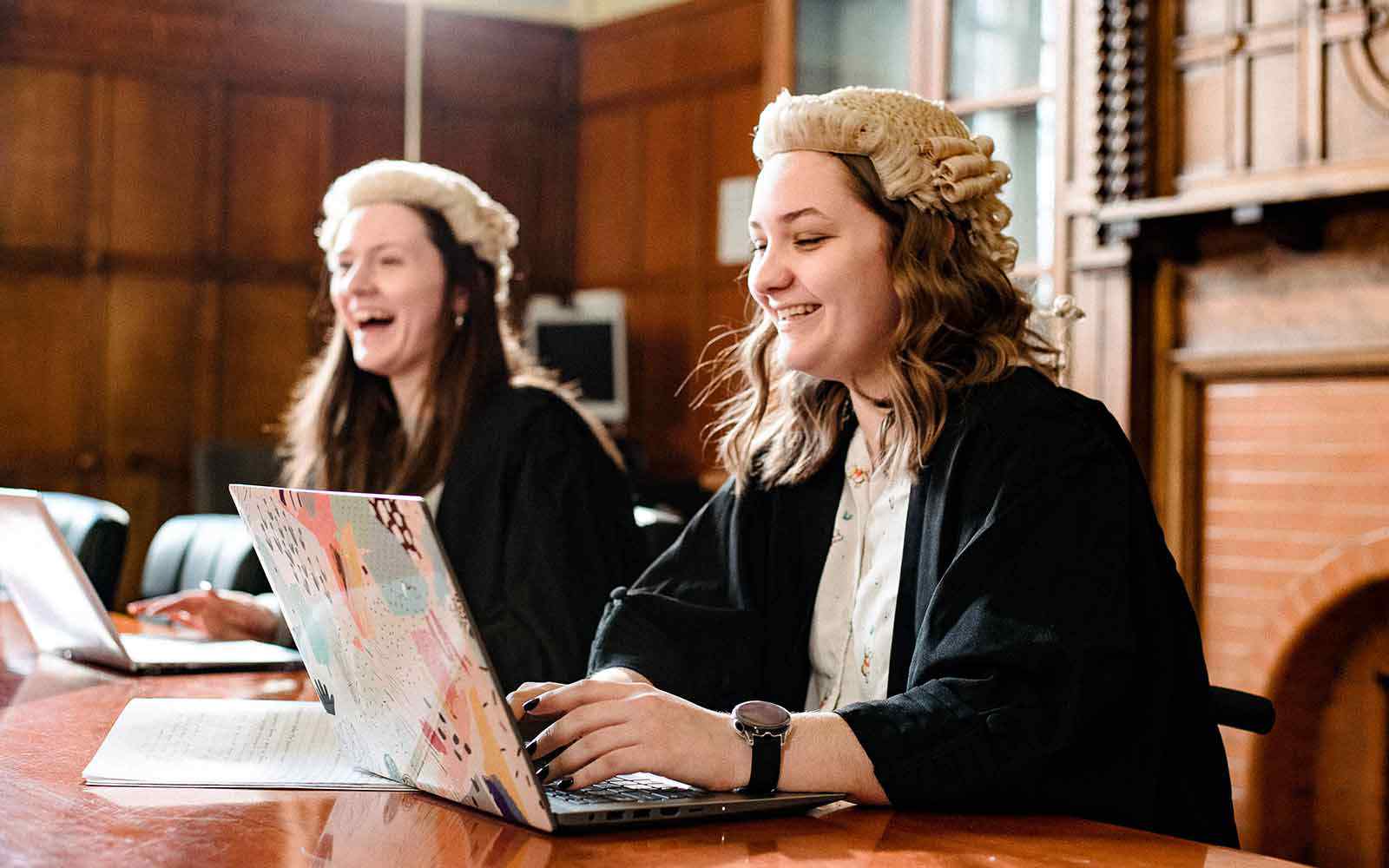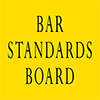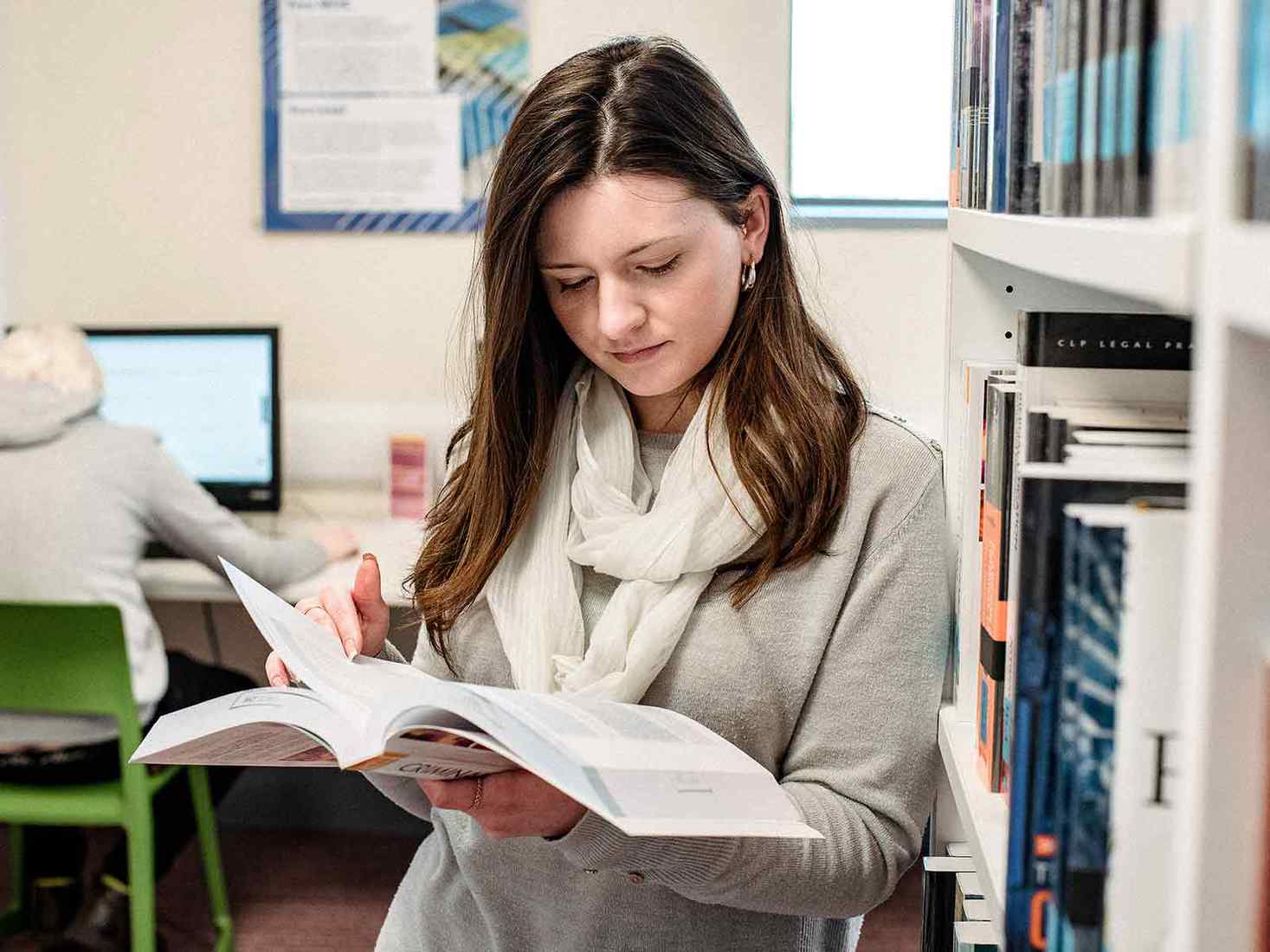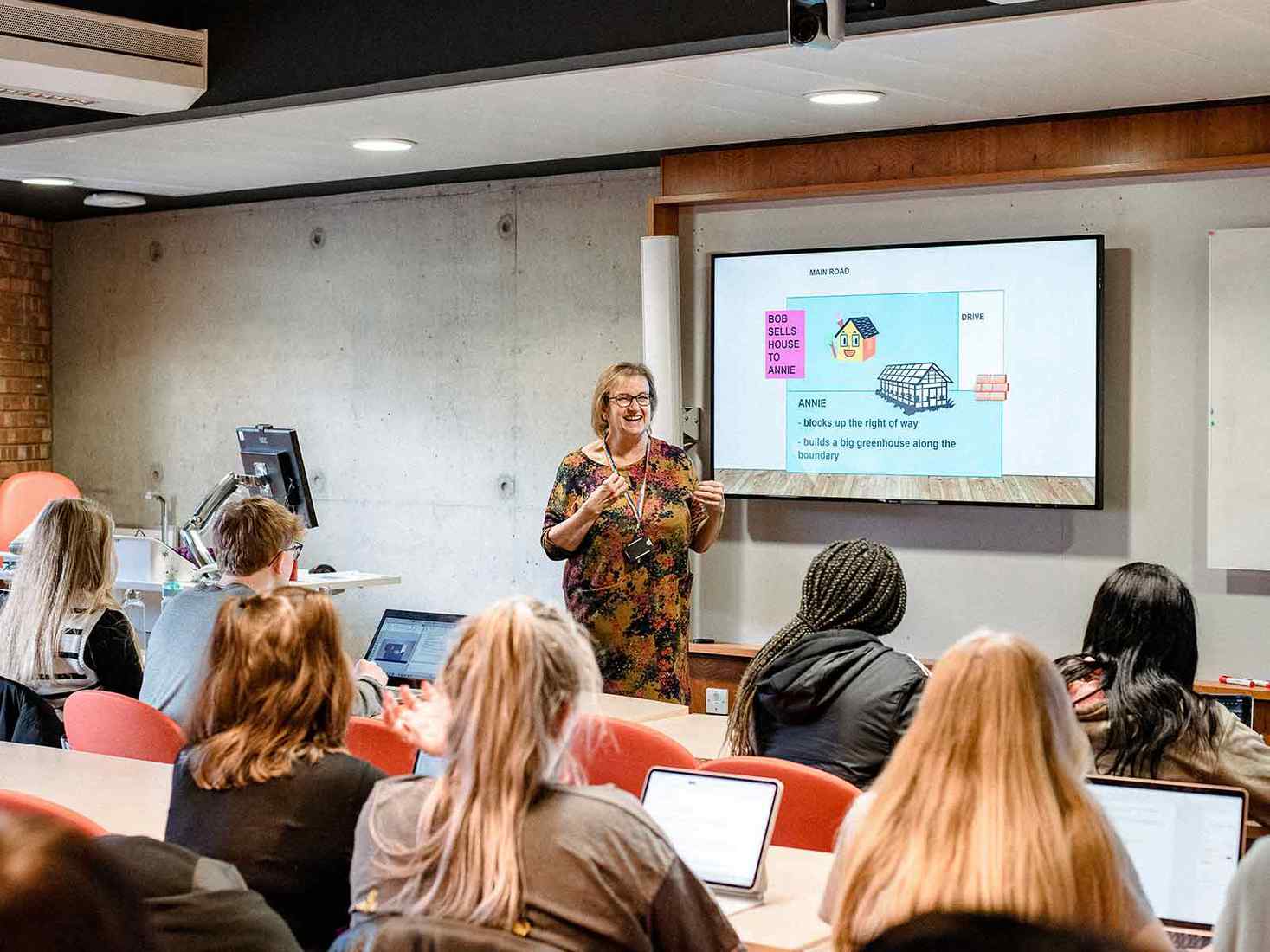Undergraduate Course
Law LLB (Hons), MLaw and MLaw Legal Practice
Study Law through interactive lectures and workshops with staff who get to know you, and gain valuable legal work experience in York St John Law Clinic.

You will choose from 3 routes: Law LLB (3 years), MLaw or MLaw Legal Practice (4 year integrated master's). All our courses offer practical experience over each year of study and will prepare you for your legal career after graduation.
92% Law students responded with a 92% positivity score for how good teaching staff are at explaining things. (National Student Survey 2023)
90% Law students responded with a 90% positivity score for how easy it was to contact teaching staff when they needed them. (National Student Survey 2023)
York campus
- UCAS code – LLB M100 | MLaw (2024 entry) M200 | MLaw with Foundation Year M201
-
Duration – LLB 3 years full time
MLaw 4 years full time
MLaw Legal Practice 4 years full time - Start date – September 2024, September 2025
- School – York Business School
Minimum entry requirements
104 UCAS Tariff points
3 GCSEs at grade C/4 (or equivalent) including English Language.
Tuition fees
UK 2024 entry £9,250 per year full time
International 2024 entry £14,000 per year full time
Discover Law
Chris Smith, Course Lead, introduces us to Law at York St John University.
Course overview
At York St John Law School, and across the University, our research and teaching is led by principles of social justice. This means we will encourage you to critique and question the law according to principles of equality and fairness. This will help you to develop as an independent and ethical professional as you become aware of the cultural and social contexts. You will be able to give back to your local community through your career. Graduates of these courses will be eligible to progress on to the Solicitors Qualifying Examination for aspiring solicitors and, subject to attainment, the BPTC for aspiring barristers.
Law graduates are known for their ability to think critically, analyse information and solve problems. You will develop a wide range of valuable transferable skills including teamwork, letter writing, practical research and communication skills in a variety of contexts. Our courses have been designed to prepare you to succeed in the modern, digital workplace no matter what your future ambitions. Our courses cover the crucial areas of law, while also giving you options to choose modules which suit your interests and aspirations. The first two years of study are the same across each of our courses as we introduce you to the core knowledge and skills which will underpin your chosen areas of specialism as you progress through your studies.
York St John Law Clinic
All students will have the opportunity to be a part of York St John Law Clinic. You will work alongside your peers and academics to offer advice and assistance to individuals and small businesses in the local community who cannot afford to pay, gaining experience across a variety of cases and a range of topics. York St John Law Clinic enables you to make a valuable contribution to the local community whilst you are studying, reflecting the University's commitment to social justice and allowing you to evaluate the impact of laws and legal processes on the lives of local people.
Time spent in York St John Law Clinic counts towards the two years’ Qualifying Work Experience (QWE) that you are required to accrue before qualifying as a solicitor, therefore potentially reducing the period between graduation and admission to the roll of solicitors.
Routes
Please note that students beginning their studies with us September 2023 will automatically enrol on the Law LLB (Hons). Towards the end of your second year you can choose to remain on your current route, or transfer to another route including our MLaw Legal Practice if you wish to work towards a career in legal practice. If you are starting your studies with us for 2024, you can choose the route you wish you enrol on.
All students will study the same modules in year 1 and 2 before choosing at the end of year 2 whether to:
- Remain on or transfer to the Law LLB (Hons), leaving after 3 years of study.
- Seek to do a Placement Year before returning for your third year of study.
- Remain on or transfer to the MLaw to follow a two-year academic masters tailored course.
- Transfer to the MLaw Legal Practice to follow a two-year course of study aimed at preparing you for entry into the legal professions.
Law LLB (Hons)
If you choose our Law LLB (Hons) route you will:
- Study for 3 years (with optional placement year between your second and third year)
- Have the opportunity to study abroad in semester 2 in your second year of study and take a short placement in industry.
- Gain up to 3 years' experience of working in York St John Law Clinic.
MLaw
If you choose our MLaw route you will:
- Study for 4 years with a wide range of optional modules to choose from over your final two years, culminating in an extended academic research project.
- Have the opportunity to study abroad in semester 2 in your second year of study and take a short placement in industry.
- Gain an undergraduate and postgraduate qualification which are tailored to suit your academic and future professional interests.
MLaw Legal Practice
Please note you will enrol onto either the MLaw or LLB and you can then decide to transfer to this route at the end of year 2, following a pastoral conversation with your tutor and course lead.
If you choose our MLaw Legal Practice route you will:
- Study for 4 years and gain an undergraduate and postgraduate qualification.
- Undertake preparation to join the legal profession by one of the various routes available after graduation.
- Spend 4 years in York St John Law Clinic, graduating as a skilled young lawyer with experience, ready to make an immediate contribution to employers.
Course structure
Year 1
Our academic year is split into 2 semesters. In your first year you will study:
- 3 compulsory modules in semester 1
- 3 compulsory modules in semester 2
You can find out which modules are available in each semester on the Course Specifications.
All students study the same modules during the first 2 years of the courses. These modules cover the foundation areas of law which you would expect, embed practical and transferable skills, and enable you to explore the role of law and lawyers in our community, our country, and the world.
Modules
Credits: 20
Compulsory module
Contract Law is an essential area of legal study and is required for a qualifying law degree. It is central to the understanding of private law. This module is your introduction to the legal principles relevant to the formation, content and breakdown of contractual arrangements. Your ability to identify and address problems, undertake research, and investigate policy issues in this area will improve.
Credits: 20
Compulsory module
You will begin to understand the importance and debates surrounding:
- How laws are made
- The institutions of the state, and structure of the legal system
- The key principles of constitutional and administrative law
- The fundamental principles of human rights and civil liberties
Credits: 20
Compulsory module
Criminal Law defines what we deem as a criminal offence and how rules and procedures apply to that offence. We will introduce you to the theory behind criminal law and identify how this links to the practicalities of police investigation as we introduce you to the personnel and institutions within the criminal justice system. Criminal law shall therefore be situated within theoretical and practical contexts. The combination of substantive law, skills and a range of contexts shall assist your learning process.
Credits: 20
Compulsory module
Contract Law is an essential area of legal study and is required for a qualifying law degree. It is central to the understanding of private law. This module deepens your understanding of contract law and the civil justice system, looking at the rules relating to breach of contract and other ways in which contracts may come to an end. You will learn about how disputes arising from contracts can be resolved and consider the impact of deceit, negligence or duress on parties’ contractual rights or obligations. You will begin to think about the remedies available with reference to the principles of dispute resolution within the civil justice system.
Credits: 20
Compulsory module
Law is an intellectually challenging and stimulating subject that you will be expected to develop a broad range of transferable professional skills as you come towards the end of your first year of study. We aim to deepen your understanding of the institutions of the state, how laws are made, principles of constitutional and administrative law, principles of human rights and civil liberties.
Credits: 20
Compulsory module
This module shall address more complex issues of substantive criminal law such as property offences and defences. You shall continue to integrate skills and substantive criminal law to provide context to both areas of study. The practical context shall move forward in time to link to court proceedings and the criminal courts. A sense of chronology shall be developed both in terms of the substantive criminal law and the wider criminal process.
Year 2
In your second year you will study:
- 3 compulsory modules in semester 1
- 3 compulsory modules in semester 2, or Study Abroad
Optional placement year: You may apply to undertake a placement year in industry between years 2 and 3. At the end of your second year you will decide which route you want to continue with from Year 3. You can choose from:
- Law LLB (Hons)
- MLaw
- MLaw Legal Practice
Modules
Credits: 20
Compulsory module
Tort law refers to a civil wrong that causes a claimant to suffer loss or harm. On this module you will learn to analyse tortious liability, producing information from primary and secondary legal sources. You will learn how to formulate and present sound arguments in relation to tortious liability and apply your knowledge to example problems. This module will involve critically examining the role of tort in modern society, reflecting on its changing uses and purposes, and considering limitations.
Credits: 20
Compulsory module
Property Law deals with the transactions related to both residential and commercial property. It covers specialist areas such as property finance, mortgage lending or social housing. On this module you will consider different interests such as how the law treats relationships relating to land, landlords, tenants, lenders, borrowers, and co-owners.
Credits: 20
Compulsory module
You will study the institutions and principles of the European Union (EU) in regards to its creation, constitution, institutions and substantive laws. This will allow you to prepare and build an argument, applying your knowledge to issues regarding the continued impact on the United Kingdom following Brexit. These will include the tensions between the social, political and economic issues.
We will also introduce you to the human rights law and the principles of and the relationship between the European Convention on Human Rights (ECHR) and the Human Rights Act 1998.
Credits: 20
Compulsory module
This module is your opportunity to study themes including the role and purpose of law in society, differing legal systems and theories and the concepts of justice and legal ethics. Contemporary issues and debates in the United Kingdom and around the world will be explored as you progress through this module.
Credits: 20
Compulsory module
You will take part in your first experience in York St John Law Clinic. You will be trained as a Community Legal Companion to support unrepresented parties going through court proceedings. This will give you valuable experience, transferable skills and an understanding of the law in action. This module is your opportunity to help make a difference within society as you work with members of our community.
Credits: 20
Compulsory module
Explore the United Kingdom’s new and developing relationship with the European Union, other countries and international institutions following Brexit. We will introduce you to the institutions and principles of international public law and international criminal law.
Year 3
The modules you study in your third year will depend on the route you have chosen. You can find out which modules are available in each semester on the Course Specifications. Optional modules will run if they receive enough interest. It is not guaranteed that all modules will run every year.
Law LLB (Hons)
- 1 compulsory module in semester 1
You will then choose 1 of these options:
- 2 optional modules in semester 1 and 3 optional modules in semester 2
- Dissertation or Clinical Legal Practice and 1 optional module in semester 1 and 2 optional modules in semester 2
- Dissertation and Clinical Legal Practice and 1 optional module in semester 2
MLaw
- 1 compulsory and 2 optional modules in semester 1
- 3 optional modules in semester 2
MLaw Legal Practice
- 1 compulsory and 2 optional modules in semester 1
- 3 optional modules in semester 2
Modules
Credits: 20
Compulsory module for all courses
As you begin your third year, you will look at the relationships between equity and law, and the present-day relevance of equitable principles and doctrines. This will allow you to understand the conceptual basis of the trust and for you to acquire the knowledge of the main substantive areas of trust law.
Credits: 40
Optional module
This module builds upon all your previous work and skills developed as you are given the opportunity to pursue a research project of a law related topic of your choice. An academic tutor will support you as you carry out an independent investigation in your chosen area. At the end of the module you will have learnt to produce a coherent piece of extended legal writing.
Credits: 40
This module runs across both semesters to ensure that you have the greatest opportunity to experience all aspects of clinical work, and to be able to reflect on and produce evidence as to your progress over time. You will gain transferable professional skills in your role as a Student Advisor in York St John Law Clinic. As part of this, you will provide legal advice and assistance to members of the public and small businesses across a range of legal practice areas, whilst under the supervision of legally qualified staff.
Credits: 20
An opportunity to spend a minimum of 1 day per week, over the course of a semester, undertaking a placement with a local law firm, organisation or in-house legal team. The objective of the module is to provide you with an opportunity to observe and reflect on the law in action whilst gaining valuable work experience, networking opportunities, transferable professional skills and increased confidence and awareness when applying for jobs.
Credits: 20
Teaching will focus on the rights of individuals accessing medical care and the duties of clinicians towards their patients. This module will appeal to those who may wish to either pursue a career in legal practice or work in a health and social care setting.
You can expect to study:
- The structure of healthcare in the UK
- Ethical principles of medical care
- The legal relationship between doctors and patients, and elements of clinical negligence
- The risk of multiple jeopardy for doctors and other clinical professionals: criminal, professional, coronial and employment
- Criminal liability in more detail; assault and battery, gross negligence manslaughter
Credits: 20
This module will give you an understanding of the law of evidence, the substantive law, and how to present evidence in criminal and civil proceedings in England and Wales. You will evaluate and apply the theories and principles of evidence and analyse these rules in a wider social, political and economic context. We will explore national law in its European and international contexts, including the impact of human rights considerations.
Credits: 20
This is your practical introduction to all of the main areas of commercial law and practice, building on principles of contract law. You will also consider the formation of contractual relations and the use of agency in this regard, terms of the contract, marketing arrangements and issues relating to the sale of goods in both a commercial and consumer context.
Credits: 20
On this module you will study the substantive law and procedures that regulate domestic relationships within England and Wales. You will use your legal research skills to interrogate primary and secondary sources, apply your knowledge to problems, and build coherent logical arguments. Alongside exploring the law in practice through conducting a relevant case in York St John Law Clinic, you will gain valuable transferable skills in context.
As part of this module you will study:
- Family law
- The family justice system
- Marriage and divorce
- Cohabitation
- Domestic violence
- Legal parentage
Credits: 20
The main role of a mental health lawyer is to represent patients at Mental Health Tribunals. If you wish to go in to this profession in the future this module will explore the key elements of mental health as well as mental capacity law and procedure in England and Wales. The Mental Capacity Act 2005 is a law that protects vulnerable people over the age of 16 around decision-making.
Apply your knowledge and offer legal advice and assistance for a relevant case in York St John Law Clinic, thereby acquiring an understanding of the practical and professional considerations in this area of legal practice.
Credits: 20
You will be introduced to the legal and practical considerations associated with running a business in England & Wales. These will include:
- Different business media
- Forming a partnership or incorporating a company
- Contractual issues and practicalities associated with running a company
- Matters associated with ceasing trading
Credits: 20
Building on your understanding of Property Law you will study the various stages of a registered residential freehold property sale and purchase. In regards to this, you will assess the appropriate steps to take and the documents needed at each stage of the process.
The stages of the process will look at:
Pre-exchange of contracts
Exchange of contracts
Post-exchange of contracts
Post Completion
Credits: 20
Your Will lets you decide what happens to your money, property and possessions after your death. Therefore, the content, format and validity of wills is the focus on this module. Whilst other areas of obtaining grants of representation and administration of an estate will be taught on this module. You will also gain experience in drafting a legally effective will and associated documents in York St John Law Clinic. Apply your knowledge and offer legal advice and assistance for a relevant case in York St John Law Clinic, thereby acquiring an understanding of the practical and professional considerations in this area of legal practice.
Credits: 20
On this module you will build on your knowledge of criminal law from a previous modules as you look at the impact and effects of:
- Societal responses to criminal law
- Stalking and harassment
- Public Order
- Communication offences
- Hate and Terror offences
- Sexual offences
Credits: 20
Employment law regulates the relationship between employers and employees including what employers can expect from employees. The focus also will involve employees working rights. Various topics on this module will be discussed including:
- Discrimination in employment
- Harassment and victimisation
- Age and disability discrimination
- Maternity and family orientated rights
- Trade Unions and industrial action
Credits: 20
Personal injury and clinical negligence lawyers resolve claims brought by people who have been injured. This occurs as a result of an accident or through flawed medical treatment.
This is a practical module and will appeal to you if you are considering a career in legal practice. Throughout this module you will develop a range of transferable professional skills. This is your opportunity to focus on an interesting and fast-moving area of legal practice.
Credits: 20
A key aspect on this module is understanding of the intellectual property system alongside the laws of copyright, patents, passing off, trademarks and breach of confidence facilitating critical evaluation of current issues in this dynamic area of law.
Credits: 20
Asylum and immigration are both prominent issues within news and society today. This module introduces you to principles and concepts relating to asylum and immigration law in the United Kingdom, requiring you to engage critically with the social and political implications of law and policy in this area over time and the extent to which the law is effective
Credits: 20
We will introduce you to the ethos and practices which underpin civil dispute resolution in England and Wales. This will include the negotiation, mediation and litigation.
This module is vocational in nature and you will develop a range of transferable professional skills, including the technical skill of advocacy. The module is therefore greatly beneficial for a future professional career.
Credits: 20
On this module you will be introduced to the to practices and procedures of the criminal justice system. This is your opportunity to explore the issues in a timeline from a suspect’s first encounter with the police through to trial and sentencing. The module is practical as you will develop transferable professional skills in addition to a technical understanding of the role of solicitors in the criminal justice process.
Year 4 (MLaw route)
- Dissertation across semester 1 and 2
You will also choose to study 1 of the following options:
- 2 optional modules in semester 1 and 2 optional modules in semester 2
- Clinical Legal Practice across semester 1 and 2, plus 1 optional module in semester 1 and 1 optional module in semester 2
You can find out which modules are available in each semester on the Course Specifications.
Modules
Module choices include:
- Legal Placement, Employment Law
- Business Law and Practice, Personal Injury & Clinical Negligence
- Conveyancing, Intellectual Property
- Crime and Society, Evidence
- Medical Law, Asylum and Immigration
- Civil Dispute Resolution, Criminal Litigation
Year 4 (MLaw Legal Practice route)
If you choose the MLaw Legal Practice route, in your fourth year you will study:
- 1 compulsory module across semester 1 and 2
- 2 compulsory modules in semester 1
- 2 compulsory modules in semester 2
You can find out which modules are available in each semester on the Course Specifications.
Modules
Compulsory modules:
- Business Law and Practice
- Conveyancing
- Civil Dispute Resolution
- Criminal Litigation
- Clinical Legal Practice
Teaching and assessment
Teaching and learning
In most of your modules you will learn through:
- Lectures, which will include the whole year group
- Smaller workshops. These smaller group sessions allow you to receive more individual support as you learn. They are an opportunity to discuss and debate the ideas raised in the lectures.
- Moodle, our online learning platform. We use this to provide group work, quizzes and directed independent study.
In Clinical Legal Practice, you will experience legal practice under the supervision of qualified lawyers, and have opportunities to network with local practitioners. Workshops will involve practical activity and discussion aimed at developing your skills and deepening understanding, making further use of assistive technologies. Workshops will be small group sessions for a maximum of 25 students. You will have advance preparation building on the material covered in lectures and a typical workshop format will include reflecting on your learning through preparation. You can expect sessions to be informal with an emphasis on participation and discussion, with questions actively encouraged.
You will be supported in their learning through comprehensive virtual learning environments specific to each module, with advance reading, narrated slides, podcasts, handouts, quizzes and links to useful resources. Our teaching draws on both our research and professional experience. This means your learning is informed by the most current thinking in the subject area. You can find out more about our research and backgrounds by visiting our staff pages.
Assessment
On this course you will experience a wide range of different assessment types, giving you a varied set of skills and a rounded legal education. This will include:
- Remote timed Multiple Choice Questions
- Essays
- Reports
- Portfolios
- Letters
- Oral presentations
- Research projects
In every module you will have the opportunity to practise your assessment technique before submitting your final projects. This will help you to gradually develop your skills, confidence, research skills and academic writing.
Career outcomes
Your future with a degree in Law
This course will prepare you for a career in the legal sector. The skills you build will also open up many other career options. These skills include critical thinking, problem solving and researching.
This degree could be the first step toward your career as a:
- Barrister
- Solicitor
- Paralegal
- Human resource professional
- Business manager
- Civil Service worker
Discover more career options on Prospects careers advice pages.
You could also progress onto a postgraduate degree and take your learning even further.
PGCE at York St John University
Further your education and work towards a rewarding career in teaching by studying for a Postgraduate Certificate in Education (PGCE) after you graduate. For over 180 years, we have worked with enthusiastic individuals who want to shape the future of young people across both primary and secondary school settings. You'll spend a lot of time in schools, developing your practice by teaching. You will graduate with Qualified Teacher Status and become part of the well respected alumni of York St John educators.
Whatever your ambitions, we can help you get there.
Our careers service, LaunchPad provides career support tailored to your ambitions. Through this service you can access:
- Employer events
- LinkedIn, CV and cover letter sessions
- Workshops on application writing and interview skills
- Work experience and volunteering opportunities
- Personalised career advice
This support doesn't end when you graduate. You can access our expert career advice for the rest of your life. We will help you gain experience and confidence to succeed.
Entry requirements
Qualifications
Minimum entry requirements
104 UCAS Tariff points
3 GCSEs at grade C/4 (or equivalent) including English Language.
Calculate your UCAS Tariff points
International students
If you are an international student you will need to show that your qualifications match our entry requirements.
Information about international qualifications and entry requirements can be found on our International pages.
If English is not your first language you will need to show that you have English Language competence at IELTS level 6.0 (with no skill below 5.5) or equivalent.
This course is available with foundation year
If you do not yet meet the minimum requirements for entry straight onto this degree course, or feel you are not quite ready for the transition to Higher Education, this is a great option for you. Passing a foundation year guarantees you a place on this degree course the following academic year.
Mature Learners Entry Scheme
If you have been out of education for 3 years or more and have a grade C GCSE in English Language or equivalent, you are eligible for our entry scheme for mature learners. It's a scheme that recognises non-traditional entry qualifications and experience for entry onto this course. Information on how to apply can be found on our dedicated page.
Terms and conditions
Our terms and conditions, policies and procedures contain important information about studying at York St John University. You can read them on our Admissions page.
Fees and funding
To study for an undergraduate degree with us, you will need to pay tuition fees for your course. How much you pay depends on whether you live inside the UK, or internationally (outside the UK). Tuition fees may be subject to inflation in future years.
UK 2024 entry
The tuition fee for 2024 entry onto this course is:
- £9,250 per year for full time study
- £6,935 per year for the first 4 years if you study part time
These prices apply to all UK, Jersey, Guernsey and Isle of Man students
You can find out more about funding your degree by visiting our funding opportunities page:
Placement year funding
If you choose to take a placement year, and your course offers it, you can apply for the Tuition Fee and Maintenance Loan for your placement year. How much you are awarded is based on the type of placement being undertaken and whether it is a paid or unpaid placement. The tuition fee for your placement year will be reduced.
Tuition fees
UK 2024 entry £9,250 per year full time
International 2024 entry £14,000 per year full time
International 2024 entry
The tuition fee for 2024 entry to this course is £14,000 per year for full time study.
This price applies to all students living outside the UK.
Due to immigration laws, if you are an international student on a Student Visa, you must study full time. For more information about visa requirements and short-term study visas, please visit the International Visa and Immigration pages.
Find out more about funding your degree:
Additional costs and financial support
There may also be some additional costs to take into account throughout your studies, including the cost of accommodation.
Course-related costs
While studying for your degree, there may be additional costs related to your course. This may include purchasing personal equipment and stationery, books and optional field trips.
Study abroad
For more information on tuition fee reductions and additional costs for studying abroad, please visit our study abroad pages.
Accommodation and living costs
For detailed information on accommodation and living costs, visit our Accommodation pages.
Financial help and support
Our Funding Advice team are here to help you with your finances throughout your degree. They offer a personal service that can help you with funding your studies and budgeting for living expenses.
For advice on everything from applying for scholarships to finding additional financial support email fundingadvice@yorksj.ac.uk.
Course highlights
Fully accredited Law degree
These are Qualifying Law degrees, accredited by the Bar Standards Board.
Choose your specialism
We make sure you cover the essentials. Choose optional modules to suit your interests and goals.
Learning beyond the classroom
You will have opportunities to engage with the legal community in the region, visit courts in York and London, and take part in debates and mooting.

Benjamin Law
The course has allowed me to question the very nature of what is legal and what isn't and how it conflicts with reason. It also has taught me the real world application that I will take forward. YSJ has prepared me for my future as they have given me the chance to find out what I really want out of life. They have shown me that any prospect is feasible if I work hard enough.

Hannah Law
I have loved every minute of my time here, after transferring in my second year I immediately knew I had made the right decision. I have made so many friends and met some amazing people, I could not have chosen a better university. I am looking forward to carrying out my postgraduate studies here as there is a real sense of community. I feel proud to be able to attend this university as a third generation family member.

Timothy Law
The highlight of my time at York St John University has been working with clients on real life cases. This has allowed me to use my knowledge I've gained and put it to practical use, it has also provided me with valuable work experience and an opportunity to give back to the community. The LLB course is preparing me for the future by providing me with valuable work experience that cannot be found elsewhere.

Jade Law
The amount of support from all of the York St John University lecturers is unbelievable. Nothing is too much trouble, and if you put in the work they will do everything they can to support you and give back as much as possible. All of the teaching classes are small, so the lecturers know their student's personally and can tailor sessions to suit everyone's individual needs.

George Law
A highlight for me has been the trip down to London with my course friends and lecturers. Being able to see the Old Bailey and the palace of Westminster brought what we had been learning about into reality. The course content is something that stood out to me at York St John when deciding what university to study. At YSJ on the law course, the optional modules in second and third year are really interesting and are going to provide me with a very strong basis of multiple different areas of the law when going on into practice.

Kate Law
I am a mature student and have not been to university before, so the experience is entirely new to me. I was worried that being out of education for so long I would struggle with assignments and exams. However, I have worked so hard and I have surprised myself at what I have been able to achieve. Being a student at York St John University has taught me to think in a different way and to believe in myself and my potential. In essence my highlight has been seeing myself grow both academically and as a person. The tutors on the course all have an abundance of industry experience and share this with us in many ways and are all happy to help with C.V's and practical advice either for study or work.

Kai Law
A highlight of my time at York St John University is achieving a good work-life-study balance. This has created a perfect balance whilst at York St John University because I have had enough time to focus on my degree, with the availability to seek enjoyment. I think one of the main reason for this is the fact that York St John University is situated close to the centre of York. Even though the campus is small, it has everything you need. There is not a single highlight of my time at York St John University, but a collection of reason why I enjoy my time here so thoroughly.




.jpg)


